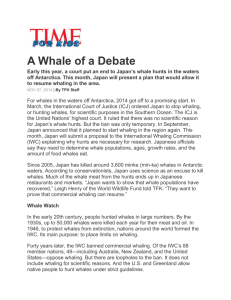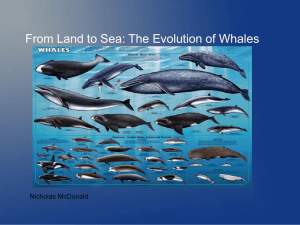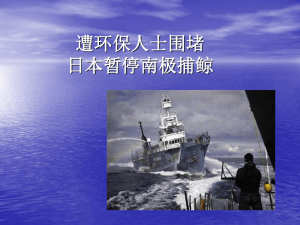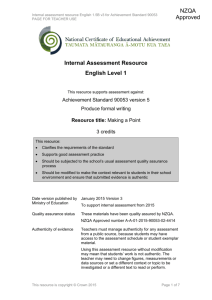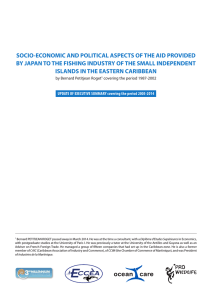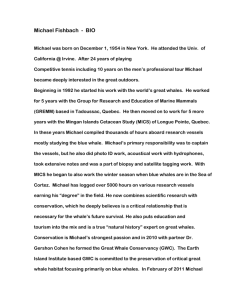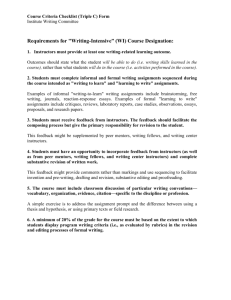Word file
advertisement
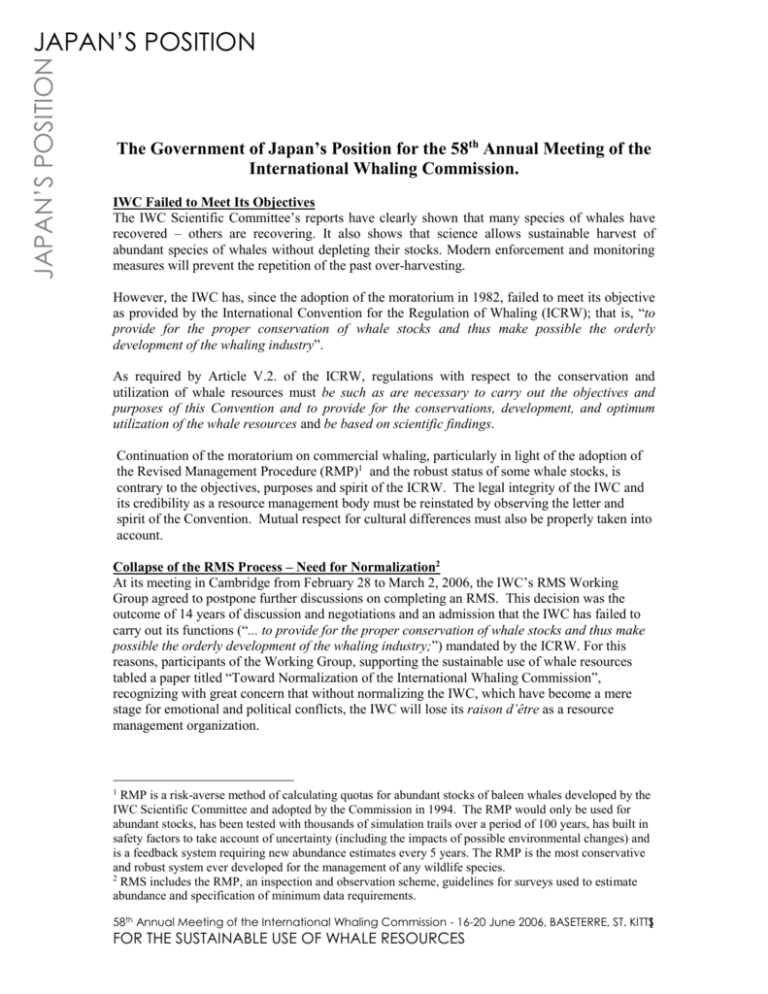
JAPAN’S POSITION JAPAN’S POSITION The Government of Japan’s Position for the 58th Annual Meeting of the International Whaling Commission. IWC Failed to Meet Its Objectives The IWC Scientific Committee’s reports have clearly shown that many species of whales have recovered – others are recovering. It also shows that science allows sustainable harvest of abundant species of whales without depleting their stocks. Modern enforcement and monitoring measures will prevent the repetition of the past over-harvesting. However, the IWC has, since the adoption of the moratorium in 1982, failed to meet its objective as provided by the International Convention for the Regulation of Whaling (ICRW); that is, “to provide for the proper conservation of whale stocks and thus make possible the orderly development of the whaling industry”. As required by Article V.2. of the ICRW, regulations with respect to the conservation and utilization of whale resources must be such as are necessary to carry out the objectives and purposes of this Convention and to provide for the conservations, development, and optimum utilization of the whale resources and be based on scientific findings. Continuation of the moratorium on commercial whaling, particularly in light of the adoption of the Revised Management Procedure (RMP)1 and the robust status of some whale stocks, is contrary to the objectives, purposes and spirit of the ICRW. The legal integrity of the IWC and its credibility as a resource management body must be reinstated by observing the letter and spirit of the Convention. Mutual respect for cultural differences must also be properly taken into account. Collapse of the RMS Process – Need for Normalization2 At its meeting in Cambridge from February 28 to March 2, 2006, the IWC’s RMS Working Group agreed to postpone further discussions on completing an RMS. This decision was the outcome of 14 years of discussion and negotiations and an admission that the IWC has failed to carry out its functions (“... to provide for the proper conservation of whale stocks and thus make possible the orderly development of the whaling industry;”) mandated by the ICRW. For this reasons, participants of the Working Group, supporting the sustainable use of whale resources tabled a paper titled “Toward Normalization of the International Whaling Commission”, recognizing with great concern that without normalizing the IWC, which have become a mere stage for emotional and political conflicts, the IWC will lose its raison d’être as a resource management organization. 1 RMP is a risk-averse method of calculating quotas for abundant stocks of baleen whales developed by the IWC Scientific Committee and adopted by the Commission in 1994. The RMP would only be used for abundant stocks, has been tested with thousands of simulation trails over a period of 100 years, has built in safety factors to take account of uncertainty (including the impacts of possible environmental changes) and is a feedback system requiring new abundance estimates every 5 years. The RMP is the most conservative and robust system ever developed for the management of any wildlife species. 2 RMS includes the RMP, an inspection and observation scheme, guidelines for surveys used to estimate abundance and specification of minimum data requirements. 58th Annual Meeting of the International Whaling Commission - 16-20 June 2006, BASETERRE, ST. KITTS 1 FOR THE SUSTAINABLE USE OF WHALE RESOURCES The IWC is dysfunctional because of fundamental differences in the positions of its members. While some members try to establish a management system that will allow sustainable use of abundant whale stocks while protecting endangered and depleted stocks in accordance with the provisions of the ICRW, others are unalterably opposed to resumption of any commercial whaling irrespective of the status of whale stocks and irrespective of the fact that the Commission adopted a robust and risk-averse procedure (RMP) for calculating quotas for abundant stocks of baleen whales in 1994. Because of the long history of conflicts at IWC, reasonable proposals for sustainable use have been treated with doubts and skepticism. The dysfunctional IWC is tragic for both whaling peoples/communities and whale resources because they need a good conservation and management system for their future existence. Therefore, normalization of the IWC which will fulfill the provisions of the ICRW is imperative and urgent. Japan, together with other members of the IWC who support the sustainable use of whale resources, is committed to working for the “normalization” of the IWC and will therefore present at the 58th Annual meeting in St. Kitts a proposal to hold a conference during the intersessional period between the 58th and 59th Annual Meeting of the IWC, which is open to all IWC members that respect the ICRW and wish to act in accordance with the provisions of the ICRW. Japan’s whale research programs Japan began a long-term research program (JARPA) in the Antarctic in 1987 in response to claims by a number of members of the IWC that the scientific information was insufficient to properly manage whale stocks. Japan’s whale research programs are perfectly legal. Article VIII of the International Convention for the Regulation of Whaling (ICRW) specifically provides for members of the IWC to issue permits for the killing of whales for research purposes. This Article also requires that byproducts from the research (whalemeat) be processed.3 This means that whalemeat from whales caught for scientific purposes is sold on the market because it is an obligation under the Convention. Sustainable use and proper management of all marine living resources should be based on scientific findings. Indeed, Article V of the International Convention for the Regulation of Whaling requires that its regulations be “based on scientific findings”. 3 Article VIII 1. Notwithstanding anything contained in this Convention any Contracting Government may grant to any of its nationals a special permit authorizing that national to kill, take and treat whales for purposes of scientific research subject to such restrictions as to number and subject to such other conditions as the Contracting Government thinks fit, and the killing, taking, and treating of whales in accordance with the provisions of this Article shall be exempt from the operation of this Convention. Each Contracting Government shall report at once to the Commission all such authorizations which it has granted. Each Contracting Government may at any time revoke any such special permit which it has granted. 2. Any whales taken under these special permits shall so far as practicable be processed and the proceeds shall be dealt with in accordance with directions issued by the Government by which the permit was granted. 58th Annual Meeting of the International Whaling Commission - 16-20 June 2006, BASETERRE, ST. KITTS 2 FOR THE SUSTAINABLE USE OF WHALE RESOURCES Further, it has been clearly established that increasing whale populations are consuming huge quantities of marine living resources and that in some areas whales are consuming fish that are also the direct target of fisheries. For example, in the Northwestern Pacific, whales are increasing and consume at least 10 species of commercially important fish species while fisheries landings in Japan have been reduced from approximately 12 million tons in the late 1980s to less than half of that today. This “coincidence” cannot be ignored in the management and recovery of the fisheries resources in the area. The consumption of fish by whales must therefore be considered in the development of ecosystem or multi-species approaches which will improve the management of all marine living resources. Criticism of Japan’s whale research program based on emotional reasons ignores both science and international law and is a rejection of the basic principle that resources should be managed on a scientific basis. Japan therefore rejects the criticism of its research programs by anti-whaling members of the IWC who wrongly state that lethal research is not required and who wrongly label the research as “commercial whaling in disguise”. Furthermore, we express our deep concern for the safety of our scientists and vessel crews subjected to the unlawful and dangerous actions of Greenpeace and the Sea Shephard Conservation Society. Japan believes that the unlawful and dangerous actions of NGOs interfering with its research program in the Antarctic should be strongly condemned by all IWC members and will seek the adoption of a resolution or recommendation urging appropriate restraint. In its 1997 review of this research program, the Scientific Committee reported “The information produced by JARPA has set the stage for answering many questions about long term population changes regarding minke whales in Antarctic Areas IV and V.” , and that “…JARPA has already made a major contribution to the understanding of certain biological parameters” The Scientific Committee also “noted that JARPA is at the half-way point and has provided substantial improvement in the understanding of stock structure.” and, “…there was general agreement that the stock structure data were of value to management”. It is also important to note that “…the meeting noted that there were non-lethal methods available…but that logistics and the abundance of minke whales in the relevant Area probably precluded their successful application.”4 In March of 2005, the 18 year research program in the Antarctic (JARPA) was completed. The program provided a wide variety of important information on biological characteristics, such as natural mortality and changes in the age of maturity of minke whales, and other relevant factors such as stock structure necessary for sustainable management under a commercial whaling regime. Data from the research program also showed that there is a major shift occurring among baleen whale species where we are witnessing a surprisingly rapid growth in the abundance of fin and humpback whales in the Antarctic and a possible slowing in the increase of the abundance of minke whales. Understanding this major shift is required as the basis for ensuring sustainable use of these abundant resources. For these reasons Japan initiated a new research program in the Antarctic beginning in 2005. Results of the research will form the basis for the establishment of a new and improved management 4 The above 5 quotes are taken from IWC document 49/4 Report of the Scientific Committee, 1997. 58th Annual Meeting of the International Whaling Commission - 16-20 June 2006, BASETERRE, ST. KITTS 3 FOR THE SUSTAINABLE USE OF WHALE RESOURCES system for whales, based on the ecosystem approach which would allow for conservation and sustainable use of abundant species, and recovery of depleted species. Japan’s other research program is carried out in the western North Pacific (JARPN). This program which began in 1994 was also reviewed by the Scientific Committee which “noted that…information obtained during JARPN had been and will continue to be used in the refinement of Implementation Simulation Trials for the North Pacific minke whales, and consequently were relevant to their management.”5 Phase II of this program (JARPN II) began in August 2000. The main objective of this research is to determine what whales are eating, how much and where. Data from these studies will be used as input to ecosystem models to improve the management of all marine living resources in the western north Pacific. This research is consistent with the unanimous decision of the IWC in 2001 to make the study of interactions between whales and fisheries a priority. It is also consistent with the commitments of the FAO’s Committee on Fisheries and the Johannesburg Plan adopted at the 2002 World Summit on Sustainable Development to the development and implementation of ecosystem approaches to fisheries management. Both the research programs involve non-lethal research including sighting surveys and biopsy sampling as well as the killing of a small number of whales for research that can not be done by nonlethal means. This includes examination of ear plugs for age determination studies, examination of reproductive organs to determine maturation, reproductive cycles and reproductive rates, examination of stomachs for analysis of diet consumption and measurement of blubber thickness as an indication of body condition and food availability. Small scale coastal whaling Since 1986, Japan has presented documentation on the localized and small-scale nature of community-based whaling in Japan, and the socio-economic importance of whalemeat production, distribution and consumption in four small coastal whaling communities. The IWC has specifically recognized the socio-economic and cultural needs of these communities and the distress to these communities which resulted from the cessation of minke whaling and in 1993 resolved to work expeditiously to alleviate this distress.6 This commitment was reaffirmed by resolutions adopted at the 52nd and 53rd Annual Meetings. However, the IWC has been denying Japan’s request to allocate an interim quota to alleviate the distress for the last sixteen years. At the 56th Annual Meeting, the IWC adopted a resolution by consensus recognizing the continuing difficulties of Japan’s small-type whaling communities and, encouraging IWC members to co-operate towards a resolution of this matter.7 It is in fact discriminatory that the IWC continues to provide aboriginal subsistence quotas to satisfy the cultural and dietary needs of the people of some members while it continues to reject the culture and needs of Japanese people in these coastal communities. Japan will therefore propose the immediate resumption of community based whaling with quotas of up to 150 minke whales and possibly 150 Bryde’s whales as a tentative measure. 5 IWC document: Report of the Workshop to Review the Japanese Whale Research Programme under Special Permit for North Pacific Minke Whales (JARPN), Tokyo, 7-10 February 2000. 6 IWC Resolution 45/51 7 IWC Resolution 2004-2. 58th Annual Meeting of the International Whaling Commission - 16-20 June 2006, BASETERRE, ST. KITTS 4 FOR THE SUSTAINABLE USE OF WHALE RESOURCES Whaling under these quotas will provide a demonstration of Japan’s ability to strictly and responsibly regulate whaling and to implement inspection and observation measures in a transparent manner. Sanctuaries without a scientific basis are contrary to the Convention Japan is opposed to continuation of the Southern Ocean Sanctuary and the establishment of new sanctuaries because they are without scientific justification and apply “irrespective of the conservation status of whale stocks”, contrary to Article V of the ICRW and to the principle of sustainable use of resources that is the world standard. Sanctuaries are an inappropriate management strategy since they do not provide additional or necessary protection to whales nor do they improve protection of whale habitat. Further, they do not address other anthropogenic or environmental factors. In this sense, sanctuaries are also inconsistent with the precautionary approach. Article V of the ICRW which sets out the requirements for the Commission’s regulations states that these “shall be based on scientific findings”. The Southern Ocean Sanctuary was adopted by the Commission in 1994 without advice from the Scientific Committee that such measure was required for conservation purposes. It must also be noted that outside experts invited to the IWC56 in Sorrento to participate in the work of the Scientific Committee to review the Southern Ocean Sanctuary (SOS) in the context of Marine Protected Areas (MPAs) said that “Overall, the Southern Ocean Sanctuary (SOS) – and IWC sanctuaries in general – are not ecologically justified” and that “… the SOS is more prohibitive than precautionary.” For these reasons, existing IWC Sanctuaries should be abolished and proposals for new sanctuaries rejected. Japan intends to propose an amendment to the Schedule, the effect of which would be that the Southern Ocean Sanctuary apply only in accordance with Article V in order to correct this situation. The Conservation Committee It is the view of Japan that the so-called “Berlin Initiative” adopted at the 55th Annual Meeting which established the Conservation Committee was an inappropriate attempt to distort the fundamental purpose of an international treaty by simple majority vote. The purpose of the ICRW is clearly stated as “to provide for the proper conservation of whale stocks and thus make possible the orderly development of the whaling industry”. Contrary to this, the “Berlin Initiative” is intended to focus the work of the IWC only on total protection for all whales irrespective of the conservation status. At the 55th Annual Meeting, proponents of the “Berlin Initiative” refused to include the concept of “sustainable use” into the text of the resolution. This provides a clear demonstration that the establishment of the Conservation Committee is also contrary to the principle of sustainable use adopted at the 1992 Rio Summit and confirmed in other international Conventions and declarations subsequently, including at the WSSD in 2002, where the international community agreed to the principle of sustainable use and conservation of marine living resources. Japan further believes that the outcome of the vote to adopt the “Berlin Initiative” (25 yes, 20 no, 1 abstention) demonstrates that the establishment of the Conservation Committee will only exacerbate the polarized situation that has made the IWC dysfunctional. For these reasons, Japan is in no position to participate in the work of the Conservation Committee unless fundamental and visible changes are made to its structure. 58th Annual Meeting of the International Whaling Commission - 16-20 June 2006, BASETERRE, ST. KITTS 5 FOR THE SUSTAINABLE USE OF WHALE RESOURCES Secret Ballot Since 1997, Japan has proposed that the IWC institute a provision for the use of secret ballots as part of its voting system. These proposals were made in an attempt to protect the rights of Contracting Parties to express their views freely and according to democratic procedures without fear of coercion or reprisals. Japan is of the view that current voting procedures within the Commission not only subjugate the rights of Contracting Parties to undue pressure from other member nations or NGOs but also unduly influence the Commission’s decisions on matters of fundamental importance. For these same reasons, the use of secret ballots for deciding substantive matters is provided for in many international commissions and organizations including the Commission for the Conservation of Antarctic Marine Living Resources, the Convention on the Conservation of Migratory Species of Wild Animals, the Convention on International Trade in Endangered Species of Wild Fauna and Flora, and the International Commission for the Conservation of Atlantic Tunas. The use of secret ballots does not conflict with the need for transparency. Transparency does not mean that the individual votes of all members must, on every occasion, be made public. A secret ballot would not prevent those members of the Commission who would wish to disclose how they voted on any issue from doing so. New Contribution Formula Japan has been a participant on the Contributions Task Force and is committed to the establishment of a membership fee structure for the IWC that is fair and equitable for developing countries. Japan will continue to support the maintenance of the interim fee structure adopted at the 54th Annual Meeting until a new fee structure is adopted. Simultaneous Interpretation Japan is also supportive of efforts by many members to have the IWC provide simultaneous interpretation. This has become a particularly important issue with the growing non-English speaking membership of the IWC. IWC wasting time and resources Japan is also concerned that the IWC is wasting time and valuable resources on non-essential items and even items outside the competency of the IWC. These include: whale-watching, whale killing methods and associated welfare issues, health issues and small cetaceans. At past meetings, Japan has proposed the deletion of these items. Small Cetaceans Our intention for the 58th Annual Meeting is to only seek deletion of the sub-item titled “Commission discussion and action arising” under agenda item 13, Small Cetaceans. Although we are prepared to receive the report of the Scientific Committee concerning small cetaceans, we believe that since the Convention does not give a mandate to the Commission in respect of small cetaceans it is inappropriate that there be an agenda item for Commission discussion and action on this matter. In addition to the legal issue Japan believes there are also practical matters that make it inappropriate for the Commission to involve itself in the management of small cetaceans including the regional nature of the distribution of small cetaceans, habitat situations and, human activities including fisheries. We also stress that since the IWC is unable to manage whaling for those species for which it has a clearly defined mandate it could not and should not attempt to “manage” small cetaceans. 58th Annual Meeting of the International Whaling Commission - 16-20 June 2006, BASETERRE, ST. KITTS 6 FOR THE SUSTAINABLE USE OF WHALE RESOURCES Management of small cetaceans would involve a very large number of species (IWC is only responsible for the management of 13 species) complicated by poorly known status and distribution of some of these, large bycatches of some species, and utilization. Management of small cetaceans by the IWC would therefore directly affect fisheries and non-fisheries activities within the 200 mile zones of coastal nations. St. Kitts and Nevis Declaration The Government of Japan sincerely appreciates the efforts of the Government of St. Kitts and Nevis in hosting the 58th Annual Meeting of the IWC. Japan fully supports the Declaration circulated by the Government of St. Kitts and Nevis which emphasizes the fact that sustainable whaling is possible and that the use of cetaceans contributes to sustainable coastal communities, sustainable livelihoods, food security and poverty reduction. The declaration also stresses the need to respect the cultural diversity and traditions of coastal peoples as well as coastal state rights and relevant national and international law. The Declaration also highlights the need for science-based management, policy and rulemaking and consideration of ecosystem approaches all of which are the accepted global standard. For more information contact Japan Delegation Media Office in St. Kitts: Glenn Inwood +1-869-764-4301 邦人記者の方はこちらまでご連絡ください: ガブリエル ゴメス : +1-869-669-4252 現地から呼び出す場合: 669-4252 日本から呼び出す場合: 010-1-869-669-4252 Download this document at: www.icrwhale.org/eng/58JapanPosition.pdf www.icrwhale.org/eng/58JapanPosition.doc 58th Annual Meeting of the International Whaling Commission - 16-20 June 2006, BASETERRE, ST. KITTS 7 FOR THE SUSTAINABLE USE OF WHALE RESOURCES
